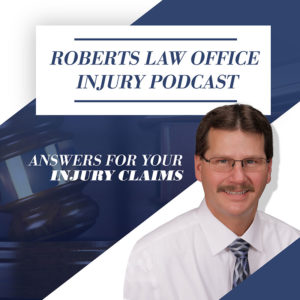Episode 72: In this episode, Calloway County workers’ compensation attorney Jeff Roberts explains 5 common misunderstandings about workers’ comp that workers often have. Unfortunately, some of those may keep an injured worker from pursuing his/her right to workers’ compensation benefits. Let’s hope that changes after today’s discussion.
For some injured workers’ this may be their first time filing a Kentucky workers’ comp claim. There may be some assumptions and/or confusion about the process and how it might affect them.

Misunderstanding #1 – Do I Have to Tell My Employer I Was Injured?
There are some workers’ who fear telling their supervisor about a work-related injury. Some people are concerned the company could retaliate against them because they reported the injury. That retaliation might be getting fired or maybe not get a raise they deserve. Could they get passed over for a promotion or not given overtime?
Clarification: The truth is Kentucky’s worker’s compensation law requires an injured worker to report the injury to his/her supervisor/manager or someone else “higher up the ladder.” It doesn’t mean you have to do this immediately or within some arbitrary company time limit (i.e. 24 hours). You need to report the injury in a reasonable amount of time. It best not to wait, because the insurance company could try to blame the injury on a non-work activity. But again, you must report the injury within a reasonable amount of time.
Clarification: Kentucky law also prohibits an employer from retaliating against an employee who was injured on the job and/or is filing a workers’ comp claim. They can’t retaliate by limiting your hours, decreasing your pay, terminating your employment, etc., because you reported a work-related injury. Kentucky statute KRS 342.197 protects all injured workers (not just those suffering from coal-related conditions). If retaliation can be proven in court, it could result in a substantial financial award to the worker.
Misunderstanding #2 – Company Can Control Where You Go for Medical Treatment
After a workplace injury, you may need to seek medical treatment. Again, there are common misunderstandings about workers’ comp. Some companies will try to tell you which doctor or specialist you can use. Jeff has seen employers provide a specific list and requiring the employee to choose only from those “company-approved” doctors.
There may be a medical facility on staff, such as a nurse’s station inside the plant. Pilgrim’s Pride in Mayfield, General Motors in Bowling Green and several others provide an onsite medical facility for injuries. There’s no problem going there for immediate treatment. Informing the medical staff of your workplace injury satisfies your duty to notify your employer. However, you do not have to have the company’s permission to see a different doctor.
Clarification: It’s not really up to them. Under Kentucky law, you have the right to select your medical provider. This can apply to more than just a doctor. Jeff successfully argued before the Kentucky Supreme Court (along with other attorneys) that a pharmacy should be considered a medical provider. This means you can choose your own pharmacy for prescriptions to treat your work-related injury. You could also pick your own physical therapy or chiropractor.
Understand that some employers may have a managed care plan. They can require you to use that plan, but they have to let you select the doctor you want, from a list of doctors who participate in that plan.
In Episode 68, Jeff explained the Designated Physician Form 113 for workers’ comp claims. If you do go to a company medical facility, be sure you don’t accidentally sign this form, designating the company doctor as your designated physician. You should speak with your family doctor to see if he/she is willing to be your designated physician for this injury.
Misunderstanding #3 – If I File a Claim, I May Not Be Allowed to Return to Work
Jeff has spoken with several injured workers who were worried that if they filed a workers’ comp claim, the company might prohibit them from returning to work. The vast majority of workers want to return to the workforce.
Clarification: In Kentucky, you can be awarded Permanent Partial Disability. This means you’re not totally disabled and you could return to work. The workers’ compensation system would pay you based on that level of permanent partial disability. A doctor will assign an impairment rating for your disability. Even with an impairment rating, you may be able to return to work doing the same job for the same amount of pay.
Your impairment rating is a factor in determining your workers’ compensation benefits. Jeff explains that pursuing a claim for partial permanent disability does not prevent you from going back to work. Remember, your employer cannot retaliate against you for pursuing a workers’ comp claim.
If a doctor releases you to return to work without restrictions, the company cannot refuse to bring you back, because you filed a claim.
The same applies if the doctor releases you to return to work with restrictions. If those restrictions don’t prohibit you from doing your job, again, the company can’t refuse to bring you back, as long as you can perform the essential functions of your job. This is protected by the Americans with Disabilities Act (ADA).
You can receive workers’ comp benefits, even if you’ve returned to work with an impairment rating, because it’s assumed your work-life will be shortened as a result of the injury you sustained on the job. This will probably reduce your earnings capacity in future, so the law compensates you now for that foreseeable loss.
Misunderstanding #4 – I Don’t Know Who Will Pay My Medical Bills Related to My Injury
Medical expenses resulting from a workplace injury can mount up, quickly. Jeff uses an example of a low-back injury at work. You will probably go to an ER or urgent care to immediately get treatment. Workers’ Comp will start paying your medical bills, so the worker assumes they will continue to pay the bills for your treatment and recovery, regardless of how long it takes for you to heal. Therefore, the injured worker thinks there’s no reason to file a workers’ compensation claim.
Clarification: When you suffer a work-related injury or occupational disease, there are deadlines you must meet to file a workers’ comp claim. This deadline is referred to as your statute of limitations, which Jeff discusses in Episode 55. If you fail to file your claim before the deadline, you are barred from filing one for your injury.
Jeff explains that a work-related injury generally has a statute of limitations of 2 years, from the date of your injury. If you receive temporary total disability benefits for being off work, due to your injury, the 2-year window may be able to be extended. The statute of limitations for an occupational disease is generally 3 years. You may have developed an occupational disease from the chemicals in your plant. Jeff discussed chemical injuries in Episode 44.
Once the statute of limitations has expired, the insurance company will stop paying your medical bills. They know you’ve failed to file a claim, so they’re off the hook. If you were able to file your claim, your benefits can continue for a minimum of 15 years, and potentially for the rest of your life, depending upon the severity of your injury.
If you’ve had an injury to a joint, including your spine, there’s a strong likelihood that you’ll develop arthritis. The doctor may determine your arthritis is related to your workplace injury (even if it was several years ago). You may require surgery, so workers’ comp should cover the expenses of the shoulder replacement, knee replacement, hip replacement, etc.
If you didn’t file your workers’ compensation claim and expect your personal health insurance policy to cover the medical expenses, you may be surprised to learn there are specific exclusions for work-related injuries.
Misunderstanding #5 – I Won’t Be Able to Afford a Workers’ Comp Attorney
People wonder how they’re going to pay for attorney fees, especially after getting hurt at work. They assume it might be too expensive.
Clarification: Jeff explains that the first meeting/consultation with him is always free. You won’t get billed for this regardless of whether you decide to hire him or not. He works on a contingency fee basis. This means he only gets paid, at the end of the case and only if he is successful in handling your case. If he’s not successful, he does not get paid an attorney fee, nor does he get reimbursed for the expenses he advanced for your case.
Generally, in Western Kentucky, an attorney handling a car wreck case would charge 33% of the recovery (i.e. 1/3 of the settlement). Some attorneys have increased this to 40%. However, in a workers’ compensation claim, Jeff only charges 20% (at the maximum). For many claims, it’s actually less than 20%. Interestingly Jeff refers to statistics that indicate someone using an attorney will typically recover more money and will more than offset your attorney fees.
The insurance company representing your employer in the workers’ compensation claim will certainly have an attorney advising the adjuster handling your claim. You need someone who’s going to be there to look out for your interests. It’s one of the more significant common misunderstandings about workers’ comp.
What Do Other Clients Think About Jeff?
We always encourage listeners to read the Google Reviews Jeff Roberts has received from many of his clients. A 5-Star rating and the comments are earned recognition and demonstrate Jeff’s commitment to his clients. As a solo attorney, he has more Google Reviews than some firms with multiple attorneys. Jeff shares the credit with his staff at the Roberts Law Office. Successfully representing a victim of an workplace injury is a team effort. It’s why Jeff likes to say his firm offers small town service with big city results.
Jeff Roberts Represents Injured Clients Throughout Kentucky
With offices located in Calloway County and now Christian County, Jeff has a history of representing personal injury clients, workers’ compensation clients and social security disability clients across the state. He’s represented clients from Paducah, Bowling Green, Louisville, Covington, Whitesville and many other Kentucky locations. He’s not just a Western Kentucky injury attorney.
We hope you found this episode insightful and helpful. Thank you for listening!
Is It Time to Speak with an Attorney about Your Workers’ Comp Claim?
The office phone number is (270) 753-0053 or toll free at 800-844-5108. For more information, visit www.JeffRobertsLaw.com. This podcast is meant to provide information and is not legal advice. Jeff’s principal office is located at 509 Main Street, Murray, Kentucky. Co-host Jim Ray is a non-attorney spokesperson. This is an advertisement.




